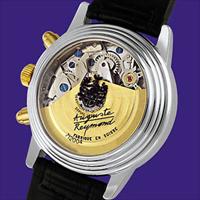History And Working Of A Wristwatch

A wristwatch (relogios) or a watch is a kind of a timepiece that a person wears for referring to time. Watches first came into existence in 1600s as a modification of spring powered clocks. Modern watches have a lot of other functions like that of a calendar in addition to the display of time.
Most common type of wristwatch (relogios) is worn on person`s wrist and is tightened with help of a watchband that is made up of nylon, leather, any other plastic strap, metal link or sometimes, even ceramic. Before this, watches were pocket watches which were carried separately.
Watch designed was greatly improved in the 21st Century due to technological advances in the field of metallurgy, physical vapor deposition and composite materials. Better materials are now used for making watches which are more durable, more accurate, more aesthetic and more reliable.
Escapement is a kind of mechanism that limits and controls the unwinding in the watch. It converts a simple unwinding into a periodic energy release. This is done by gear interlocking that switches among `driven` and `free` state.
Balance wheel along with the spring or Hairspring forms a harmonic oscillator. This oscillator controls the gear system motion in the watch. This is similar to a pendulum clock.
Tourbillon is a rotating type of frame used for escapement. It cancels out the effects of the bias in timekeeping using gravity. Otherwise, the watch would have to be kept in the same position for a lot of time.
Movement in a watch is the mechanism which measures the time and hence helps to display the correct current time. The movements can be mechanical, electronic and maybe, even both. Most of the watches use electronic timekeeping these days even if the face of watch has a mechanical hand.
Watches (relogios) are mostly classified on basis of their movements. The classifications are Mechanical Movements, Tuning Fork Movement, Electronic Movement and Radio controlled movement. The source of power used can be a spring. There are Self Winding springs also present. Some modern watches off the movement of the wearer, some watches run with the help of the batteries, or electronic power. Some watches are light powered, while some of them are powered by the body heat.
Time display is generally done in the form of Analog or Digital display. Analog display is done using two hands, one each for hour and minute and sometimes another hand is used to display seconds. In digital display, usually there is a LCD screen on which the time in digital format appears.
All the watches (relogios) show the time in atleast hours and minutes. Few watches also show the date, day and some of them even have alarms. Some more complicated watches have stopwatch, lunar phases, Perpetual Calendar, Minute repeater and equation of the time.
When the sales of Swiss watch makers went down, they redesigned it and produced a much cheaper version in end of 20th Century. With the help of some graphic designers, they also launched an array of Fashionable watches. Dual time watches (relogios) for international travelers were designed. Collectable or Jewelry type watches were designed which had high miniaturization and precision along with nice aesthetic look. Some of the leading companies for this kind of watches are Papet Phillipe, Jaeger-LeCoultre, Rolex. Mass production is done by companies like Omega, Tag Heurer and Breitling.
Other type of watches (relogios) include computerized multifunction watches with electronic items like Calculators, Digital Cameras, Video Games, GPS receivers, Cellular Phones ad Keydrives were embedded in the watches. Some recent watches have also been marketed as Water Resistant as they are not as much affected by water as other watches and are categorized on the basis of their water repelling capability.
This article can also be accessed in portuguese language from the Article section of page www.polomercantil.com.br/relogios.php
Roberto Sedycias works as IT consultant for www.PoloMercantil.com.br
amazines.com
 Back and Next - Back and Next
Back and Next - Back and Next See Also - See Also
See Also - See Also